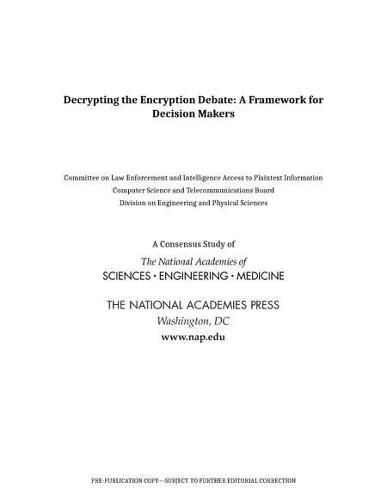Readings Newsletter
Become a Readings Member to make your shopping experience even easier.
Sign in or sign up for free!
You’re not far away from qualifying for FREE standard shipping within Australia
You’ve qualified for FREE standard shipping within Australia
The cart is loading…






Encryption protects information stored on smartphones, laptops, and other devices - in some cases by default. Encrypted communications are provided by widely used computing devices and services - such as smartphones, laptops, and messaging applications - that are used by hundreds of millions of users. Individuals, organizations, and governments rely on encryption to counter threats from a wide range of actors, including unsophisticated and sophisticated criminals, foreign intelligence agencies, and repressive governments. Encryption on its own does not solve the challenge of providing effective security for data and systems, but it is an important tool.
At the same time, encryption is relied on by criminals to avoid investigation and prosecution, including criminals who may unknowingly benefit from default settings as well as those who deliberately use encryption. Thus, encryption complicates law enforcement and intelligence investigations. When communications are encrypted end-to-end, intercepted messages cannot be understood. When a smartphone is locked and encrypted, the contents cannot be read if the phone is seized by investigators.
Decrypting the Encryption Debate reviews how encryption is used, including its applications to cybersecurity; its role in protecting privacy and civil liberties; the needs of law enforcement and the intelligence community for information; technical and policy options for accessing plaintext; and the international landscape. This book describes the context in which decisions about providing authorized government agencies access to the plaintext version of encrypted information would be made and identifies and characterizes possible mechanisms and alternative means of obtaining information.
$9.00 standard shipping within Australia
FREE standard shipping within Australia for orders over $100.00
Express & International shipping calculated at checkout
Encryption protects information stored on smartphones, laptops, and other devices - in some cases by default. Encrypted communications are provided by widely used computing devices and services - such as smartphones, laptops, and messaging applications - that are used by hundreds of millions of users. Individuals, organizations, and governments rely on encryption to counter threats from a wide range of actors, including unsophisticated and sophisticated criminals, foreign intelligence agencies, and repressive governments. Encryption on its own does not solve the challenge of providing effective security for data and systems, but it is an important tool.
At the same time, encryption is relied on by criminals to avoid investigation and prosecution, including criminals who may unknowingly benefit from default settings as well as those who deliberately use encryption. Thus, encryption complicates law enforcement and intelligence investigations. When communications are encrypted end-to-end, intercepted messages cannot be understood. When a smartphone is locked and encrypted, the contents cannot be read if the phone is seized by investigators.
Decrypting the Encryption Debate reviews how encryption is used, including its applications to cybersecurity; its role in protecting privacy and civil liberties; the needs of law enforcement and the intelligence community for information; technical and policy options for accessing plaintext; and the international landscape. This book describes the context in which decisions about providing authorized government agencies access to the plaintext version of encrypted information would be made and identifies and characterizes possible mechanisms and alternative means of obtaining information.